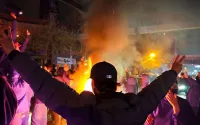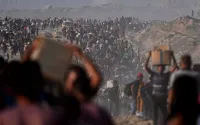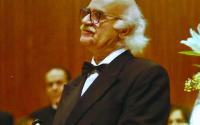Arabs are asking why Israeli brutality is deemed self-defence while Palestinians are vilified as terrorists
The Guardian,Friday, October 26, 2001Some Arabs did criticise the assassination of Israeli cabinet minister Rehavam Zeevi. But not because it was an act of terrorism. They simply shared the widespread apprehension about its impact on the hoped-for renewal of the peace process.
For there could hardly, they conceded, have been a more legitimate target for any act of terror than Zeevi. It was the Popular Front for the Liberation of Palestine's straightforward retaliation for Israel's assassination of their own leader, Ali Abu Mustafa. It was precise; there was no accidental death of uninvolved civilians. It was about as symbolically appropriate as one could get. An advocate of the "transfer" of all Palestinians out of Palestine, a man who used words like "lice", "vermin" and "cancer" to describe them, Zeevi was the incarnation of all that is most extreme, bellicose and racist in Israeli society.
Yet Israel reacted to the killing with greater ferocity than it has to any previous acts of terror, including even Hamas suicide bombings in which tens of innocents died. Apparently, the fact that Zeevi was not merely a civilian, but a minister and elected representative of a democratic country, put it, morally, in an entirely different category from Israel's own assassination of Palestinian leaders. But probably the real cause of Sharon's ferocity was the fact that, as one newspaper said, it was such an effective "blow to the head of the Israeli political system".
It also gave him the pretext to further his political agenda, which some Israelis see as nothing less than eliminating any need to make peace by eliminating the only party, Arafat and the Palestine Authority, with which it could be made. He first issued an ultimatum to the PA that was virtually impossible for it to fulfil. He then mounted the biggest military operation of its kind ever undertaken, killing almost 40 Palestinians so far. This has been accompanied by a barrage of propaganda that seeks to persuade the world that the PA has exactly the same relationship with Palestinian terror as the Taliban do with Osama bin Laden, and Israel the same right to destroy the one as the Americans do the other.
Yet it's hardly debatable: in method (individual assassination) and target (a key protagonist of the other side), what the PFLP did was the equivalent of what Israel has done countless times. So why is it, asked Arabs everywhere, that what Israel does is called self-defence, and when Palestinians do exactly the same thing it is terrorism? And why does Israel have the right to demand the extradition of culprits while the Palestinians don't?
Rarely have such contrary viewpoints so starkly illustrated the cliche that one man's terrorist is another's freedom fighter - or, in Arab eyes, the imperative need for an internationally recognised, UN-promulgated definition of just what terrorism is. Largely because of their long-standing reputation as a breeding-ground of terrorists, the Arabs have long been to the fore in pressing for one. The lack of one is part and parcel of their lukewarm response to joining the US-led global coalition against it. For it makes it easier for the US to shape an agenda with which they do not agree. They think that more should go into the definition than the State Department's terse description of it as "premeditated, politically motivated violence perpetrated against non-combatant targets by sub-national groups or clandestine agents, usually intended to influence an audience."
Broadly speaking, they want it to cover state as well as non-state agents, and to take into account both the nature of the violence and its motives and aims. They contend that Israel is a practitioner of "state terrorism". Its violence may indeed be carried out by the armed forces of an internationally recognised, lawfully constituted entity, and it may not be deliberately directed at non-combatant civilians, but in practice it ends up as a form of terrorism and, given such disproportionate firepower deployed in civilian neighbourhoods, is inherently bound to do so.
But more important, in the Arab view, is the cause. At bottom, Israel uses violence for what is internationally recognised as an illegitimate purpose, the maintenance of its occupation, and the Palestinians are using it for what is recognised as a legitimate one, the ending of it. This does not mean that their resistance cannot constitute pure, unbridled terrorism, as it does when the Islamists of Hamas carry out their suicide bombings inside original, pre-1967 Israel, territory which neither the world nor the PA recognise as occupied. But it does, or should, mean that it is much harder for the world to condemn the resistance when it confines its targets to the soldiers and settlers who are the instruments and symbols of occupation - a policy which secular groups like mainstream Fatah usually try to follow.
Soon after September 11, the US seemed to realise that of all the possible impediments to its "war on terror", the Palestine question was the most serious and potentially disastrous. As a result, after Sharon's latest excess in his war on terror, it once again finds itself at loggerheads with him. In Arab eyes the US is quite simply hoist with the petard of its traditional, institutionalised indulgence of its Israeli protege - and of a definition of terrorism which, till now, has entirely suited Israel. It is a complaisance, said Egypt's leading state-owned newspaper al-Ahram, which must come to an end; otherwise all the Anglo-American talk about a new drive for peace, and a "Palestine state" at the end of it, will be so much "political bombast".






